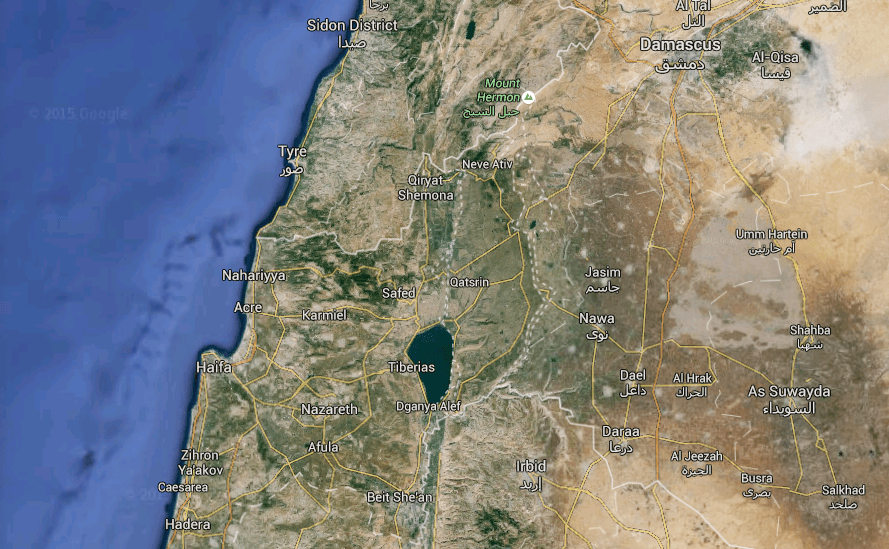In the Shadow of Syria, a Play to Redraw Borders

As Syria buckles under the weight of an increasingly fragmented internal conflict, a neighbor to the west is cementing its hold on a disputed region. During a recent meeting with President Obama, Israeli Prime Minister Benjamin Netanyahu suggested that Syria had deteriorated to the point that it was no longer a functioning state, allowing “for different thinking” regarding Israel’s claim to the Golan Heights region. According to Haaretz, the Obama administration has dismissed Netanyahu’s instigations, affirming the US’s position that sovereignty of the Golan Heights must be negotiated in line with United Nations Security Council Resolutions 242 and 338. However, with reports of a potential oil discovery in the territory and concern over the rise of ISIS in neighboring Syria, Israel may have found the motive and the means to secure the territory as its own.
Israel’s interest in the Golan Heights is clear. While the territory offers fertile land that supports Israel’s agricultural sector, the Golan Heights true appeal lies in its topography. Unlike the West Bank, the Heights are primarily a target of expansion not for cultural or historic reasons but as a territorial hold for strategic defense. From its high peaks Israel’s Galilee settlements and water resources become a vulnerable target. Possession of the Heights means access to a unique vantage point from which an attack on Israel could be mounted, and Israel would prefer to not cede the upper hand to neighboring Syria or any of the militant groups that reside within it.
In addition to preventing enemy use of the Heights, full control of the region would increase Israel’s territory, which would in turn increase its ability to survive a ground attack. Gerald M. Steinberg points to the importance of the Golan Heights, stating that Israel’s small territory and narrow borders allow “no room to absorb a major ground invasion.” For a country that has experienced war with nearly all its neighbors, an added buffer zone is an easy sell to a fearful population. If Israel needed a further incentive to hold tight to its Golan settlements, then it has arrived in the form of a coveted commodity. Estimates vary, but Genie Oil & Gas claims it has discovered a reservoir in the Heights that could contain billions of barrels of oil.
While Netanyahu courts US recognition, steps are being taken at home to secure Israel’s claims. Minister Naftali Bennett is championing what the New York Times calls an “aggressive” goal: to introduce 100,000 new residents to the small Golan Heights territory in the next five years. By expanding settlements in the contested area, Israel hopes to normalize its presence in the Golan Heights, and, in turn, legitimize its rule over the territory.
For a country set on expansion, it is hard to imagine better timing. Syria, crippled by years of civil war, is at a strategically weak point relative to Israel. As fears of ISIS reach critical mass in the West, support for (or at least a lack of objection to) an Israeli controlled Golan Heights is likely to be at its highest. Director of the Foreign Ministry, Dore Gold, recently argued that “if Israel had taken the advice of all those in the 1990s who recommended that it withdraw from the Golan Heights, we would now be facing the prospect of the Islamic State…on the shoreline of the Sea of Galilee.” His claims may have an audience as highly publicized terrorist attacks leave Western powers desperate for solutions to the problems posed by ISIS.
Even those traditionally opposed to Israeli expansion are showing signs of capitulation. Some Syrian Druse residents of the Golan Heights are reluctantly starting to see Israel as “the only realistic authority that can defend the area from extremists like the Islamic State on the other side of the armistice line.” Expanding settlements during this period of vulnerability lessens the risk of both military and political retaliation and provides incentives for local residents to ally with Israel.
Israel is hopeful that the US will be eager to appease its top Middle Eastern ally in the wake of the signing of the Iran Nuclear Deal. Land seizures in the Golan Heights tend to fall under dramatically less public scrutiny than their West Bank counterparts and offer a middle ground concession of sorts. Under US supported UNSC Resolutions 242 and 338, Israel must negotiate with Syria regarding its presence in the Heights. However, as the US is also currently supporting forces in opposition to the Syrian government, it may be hard to say for certain what the future of the Golan Heights holds.
—
Emily Fox is a Senior Editor for the Journal of Diplomacy and International Relations. She graduated from Western Kentucky University with a double major in Photojournalism and Religious Studies and is currently pursuing an M.A. in Diplomacy and International Relations at Seton Hall University, where she is specializing in Foreign Policy Analysis and International Security.
Follow Emily on Twitter: @emilyefox
Follow the Journal of Diplomacy on Twitter: @JournalofDiplo

Until now, we can see, the conflict in Syria is a crime the rulers and group interests without considering the victims. Crimes against humanity in Syria have opened the eyes to the world’s attention on the humanitarian life of concern and to provide aid to those most oppressed caused by war